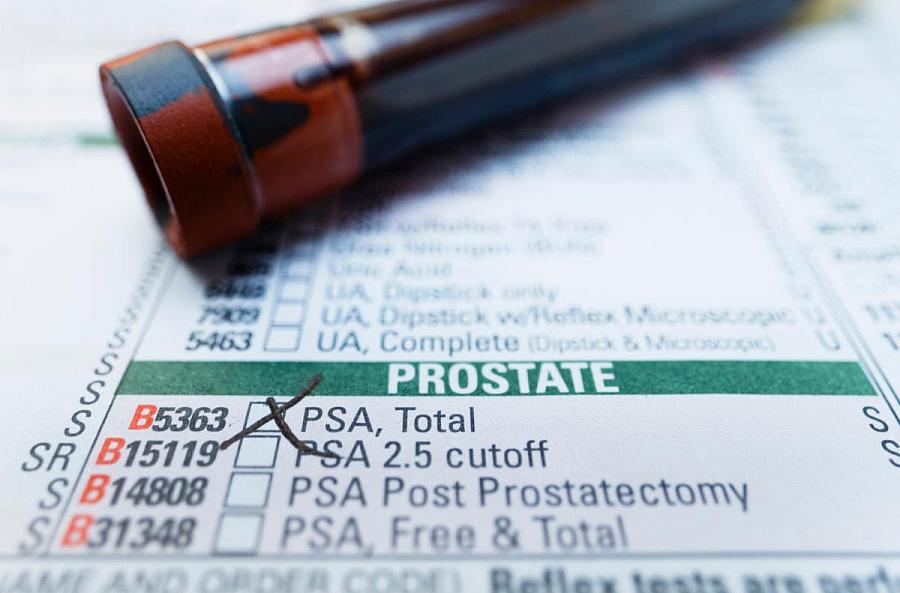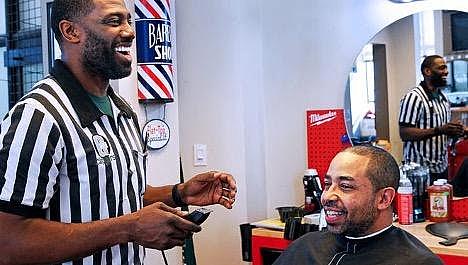The Health Divide: Black men have a higher risk of developing and dying from prostate cancer. Why?

(Photo via Getty Images)
In 2002, my father was diagnosed with stage two prostate cancer.
He was 68.
As he underwent rounds of radiation treatment, I faithfully accompanied him to his 45-minute-long appointments to destroy the cancer cells. The treatments were painless but caused him severe fatigue.
During one of his appointments at the Veterans Administration Hospital in Milwaukee, his physician suggested that I also undergo prostate cancer screening because of our family history with the disease.
Prostate cancer had impacted both of my grandfathers, three uncles, and at least three of my cousins.
At 33, I underwent my first test, and my physician assured me there was nothing to worry about. The blood test measured the level of PSA, a protein produced by the prostate gland. Elevated PSA levels are often linked to prostate cancer, but other factors like age, race, and prostate health can also impact PSA levels.
I received a negative test result, which was a relief. Despite adhering to a rigorous gym workout schedule of five days per week, maintaining a balanced diet, and abstaining from alcohol and tobacco consumption, I still had lingering concerns. As an individual of African descent with a familial predisposition to prostate cancer, I knew I must get checked regularly.
At 55, I undergo a yearly prostate screening, which involves a physical exam where a doctor checks the prostate gland by inserting a lubricated finger into the rectum. While some men view this checkup as invasive, let's face it, as a Black man I am at a higher risk of developing cancer than men of other races and ethnicities. Black men are also twice as likely to get and die from prostate cancer compared to white men, with one in six Black men developing the disease in their lifetime.
Racism is an underlying factor
After my father completed a month's worth of radiation treatments, he was able to ring the bell hanging in the hallway of the VA to signal he was cancer-free. Many people who are diagnosed early, when the cancer hasn't spread beyond their prostate, go on to live normal, cancer-free lives for years following treatment.
One in six Black men will develop prostate cancer in their lifetime, compared to one in eight men overall. Black men are also 1.7 times more likely to be diagnosed with and 2.1 times more likely to die from prostate cancer than white men, according to the Centers for Disease Control and Prevention.
Why?
African American men are less likely to be screened or treated for prostate cancer, and they are also less likely to participate in clinical research. This is due to a complex network of factors, including socioeconomic status, environmental exposures, and mistrust in the health care system.
Disparities in the incidence of prostate cancer among Black, white, and Asian-American populations may be influenced in part by variation in the androgen receptor gene. Evidence suggests that dietary patterns, genetic predisposition, and hormonal factors collectively contribute to the observed variation.
But that’s only part of it. Dr. Tito Izard, president and CEO of Milwaukee Health Services, Inc., an independent not-for-profit community health center, said while diet and family history play a role in prostate cancer, racism is an factor that people often ignore.
Izard noted that factors such as the chronic stress of discrimination in everyday life, fewer options for healthy eating and exercise, less access to health care, and discriminatory medical treatment also play a role.
The overall health of Blacks as a group will not improve until America creates a restorative health equity plan for the descendants of enslaved people, Izard said.
While it's easy to look at someone and say you need to exercise and add more and more fruits and vegetables to your diet, Izard said a more profound conversation is needed when it comes to the health of the descendants of enslaved people, and that starts with addressing the root causes of racism in this country to eliminate the sources of stress that specifically impact African Americans.
“That’s part of a much deeper conversation that must be held in this country,” Izard said.
Former NBA legend Kareem Abdul-Jabbar, writing for WebMD, shared that as a Black man, he was able to survive prostate cancer, leukemia, and heart bypass surgery due to his wealth and fame. Unfortunately, he knows that many are not so lucky.
“I’ve been fortunate because my celebrity has brought me enough financial security to receive excellent medical attention,” he said, adding that he also benefits from having children in the medical field.
“While I’m grateful for my advantages, I’m acutely aware that many others in the Black community do not have the same options. It is my responsibility to join with those fighting to change that. Because Black lives are at risk. Serious risk,” Abdul-Jabbar, 73, wrote.
Black lives are at risk, Abdul-Jabbar wrote, “(n)ot just from the diabetes, heart problems, obesity, and cancer that we as a group are prone to, but from a wide spectrum of health threats built into the foundation of American society as solidly as steel girders holding up a bridge.”
Some men are reluctant to get tested by a physician
The first time I had my prostate checked, I must admit I asked a lot of questions before the actual procedure. How long would it last? Would it hurt? And why am I doing this again? While I knew why I was being tested, when you are standing on the side of a hospital bed, and a doctor is standing behind you with a lubed-up gloved finger, it's enough to make some men change their minds.
Gaulien "Gee" Smith, owner of Gee's Clippers barbershop in Milwaukee, said a lot of Black men don't get tested because they feel like the test emasculates them.
Smith's father died at 62 of colon cancer.
He uses his barbershop to hold health forums and organizes a 5K walk-run each June, offering free health screenings. He aims to ease Black men's fears of going to the doctor and receiving checkups that can save their lives.
Clients tend to share a lot of information with their barber, and in turn, the barbers at Gee’s Clippers get clients to open up about their health. They can ask when they last went to the doctor or when they last got their prostate checked. Health pamphlets on topics like hypertension, stress reduction, and domestic violence are also available in the barbershop for men and women to pick up.
Smith pointed to the issue of Black men foregoing routine medical check-ups due to apprehension. This reluctance often grows with the amount of time since their last examination, leading them to assume good health or fear uncovering a potentially serious health problem.
Smith said that if his father had kept up with his routine checkups, he would probably be here with him today.
Early detection is pivotal for favorable health outcomes and increased survival rates. That’s not just a question of health care access or individual willpower. It requires lots of nudges, norms and conversations from trusted friends and neighbors, like the kind that happen at Gee’s.

Gaulien "Gee" Smith, owner of Gee's Clippers in Milwaukee, uses his barbershop to hold health forums and promote screenings.
(Photo Courtesy: Milwaukee Journal Sentinel)
Clients tend to share a lot of information with their barber, and in turn, the barbers at Gee’s Clippers get clients to open up about their health. They can ask when they last went to the doctor or when they last got their prostate checked. Health pamphlets on topics like hypertension, stress reduction, and domestic violence are also available in the barbershop for men and women to pick up.
Smith pointed to the issue of Black men foregoing routine medical check-ups due to apprehension. This reluctance often grows with the amount of time since their last examination, leading them to assume good health or fear uncovering a potentially serious health problem.
Smith said that if his father had kept up with his routine checkups, he would probably be here with him today.
Early detection is pivotal for favorable health outcomes and increased survival rates. That’s not just a question of health care access or individual willpower. It requires lots of nudges, norms and conversations from trusted friends and neighbors, like the kind that happen at Gee’s.

